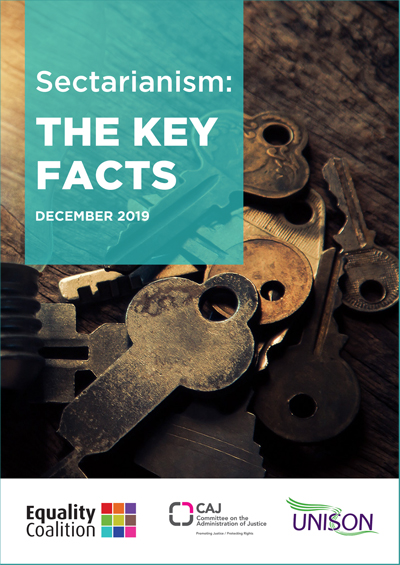Sectarianism: The Key Facts
Published:
February 17, 2020
Policy Area(s):Confronting Prejudice, Increased Equality
Keywords:Equality and Discrimination, Hate Crime, Peace Process
Commissioned by the Equality Coalition, independent researcher Dr Robbie McVeigh has authored a piece of research on contemporary sectarianism in Northern Ireland. Across 50 pages, Sectarianism: The Key Facts looks at ‘institutional sectarianism’ in NI – especially where there is evidence of sectarianism in decision-making.
Summary of key messages:
- Sectarian inequality continues to be real. There remain sectarian ‘dual markets’ in employment, housing and education in Northern Ireland. The resulting segregation is often marked by a sectarian differential in life experiences between Protestants and Catholics. In other words, their experience is often not just different or separate, but also unequal;
- The report is critical of recent statutory and academic ‘community relations’ approaches to sectarianism that focus on mindsets and perceptions, rather than facts, and overlook or problematize equality;
- There is evidence of public bodies engaging in concerted efforts to evade analysis of sectarian inequality. Baseline data is necessary in order to assess structural or institutionalised inequality;
- Sectarianism in decision-making was a contributing factor to the 2017 collapse of power sharing in NI. The report features detailed case studies on ‘single identity’ housing; the influence of sectarianism on funding allocation; and failings in the promotion of the Irish language;
- There is a significant demographic change currently in progress in Northern Ireland. Originally founded on the basis of a Protestant majority, NI may soon have a Catholic majority instead. In this “new demographic context”, Catholics may well discover what women have known for many years – namely that being in the majority does not necessarily guarantee any protection from discrimination and inequality. Contrariwise, new issues may well emerge from Protestant minority status;
- The ‘Other’ category is also growing in NI, making it unviable to continue to rely on a binary ‘Protestant’ and ‘Catholic’ analysis of ethnicity in Northern Ireland;
- The report concludes: “We need an approach which re-centres the commitment to equality and human rights of all citizens – Protestant, Catholic and “Other” – who meet at the interface of sectarianism in the very particular circumstance of the Northern Ireland state. At the core of this approach is the recognition that tackling sectarianism is about building a radically different future rather than reconciling people to the present – a present that remains contested, unequal and profoundly sectarian.”
The full report can be downloaded via this link.
The Equality Coalition is co-convened by UNISON and CAJ.
